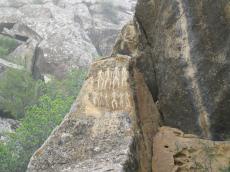|
|
TODAY.AZ / Society
New petroglyphs discovered in Gobustan State Historical Reserve
06 August 2022 [10:43] - TODAY.AZ

By Azernews
By Laman Ismayilova
New petroglyphs have been discovered in Gobustan State Historical Reserve, Azernews reports, citing APA.
Speaking about new findings, the director of Gobustan National Historical and Artistic Reserve, Vugar Isayev, spoke about the recently-found Sona-gaya petroglyphs and stones at Jingirdag-Yazili Tapa.
The three-year research on the territory of Jingirdag-Yazili Tapa has led to the discovery of 1,347 petroglyphs and symbols ( before 877), engraved on 169 stones (before 151). The new discoveries were documented and registered.
The reserve director added that a recently printed catalog "Gobustan petroglyph bridge- Jingirdag-Yazili Tapa" contains the results of research.
Gobustan rock carvings were discovered in 1939 at the foot of the mountain Jingirdag and on the top of Yazili Tepe.
The rock engravings depict primitive men, animals, battle pieces, ritual dances, bullfights, boats with armed oarsmen, warriors with lances in their hands, camel caravans, and pictures of the sun and stars.
These unique petroglyphs were recognized as UNESCO World Heritage Sites in 2007.
Regular research and archaeological work are carried out in the reserve with the participation of local and foreign experts.
In 2016, digital data about Gobustan started operating in order to re-document Gobustan rock carvings using modern methods.
Within its framework, 3D modeling was used for the first time in the study of Gobustan's rock art.
URL: http://www.today.az/news/society/223843.html
 Print version
Print version
Connect with us. Get latest news and updates.
See Also
- 17 April 2025 [10:23]
Shusha hosts First Islamic World Cultural Forum on heritage protection - 16 April 2025 [19:36]
Astana hosts second Central Asian Media Forum - 16 April 2025 [15:21]
Heavy rain hits Baku overnight, more expected through April 17 - 16 April 2025 [15:11]
Career Readiness Week kicks off at ADA University to prepare students for workforce entry - 16 April 2025 [14:33]
Baku, Minsk mull ways to deepen healthcare cooperation - 16 April 2025 [11:24]
BIG calls for reparations and global accountability at UN decolonization conference - 16 April 2025 [10:12]
Traffic police enforce safety measures amid Baku downpour - 15 April 2025 [15:37]
Ukrainian children affected by war begin rehabilitation in Quba - 15 April 2025 [12:36]
TURKPA delegation honors Patriotic War martyrs at Victory Park in Baku - 15 April 2025 [12:22]
Azerbaijan thwarts drug smuggling attempt via UAV from Iran
Most Popular
 Azerbaijan discusses co-op & regional stability with Syrian Transitional Government
Azerbaijan discusses co-op & regional stability with Syrian Transitional Government
 The "parallel" worlds of Armenia
The "parallel" worlds of Armenia
 Robert Kocharyan's promotion of ethnic hatred against Azerbaijanis exposed
Robert Kocharyan's promotion of ethnic hatred against Azerbaijanis exposed
 Accused French spy Martin Ryan claims his ties were ‘personal’
Accused French spy Martin Ryan claims his ties were ‘personal’
 China bans its airlines from purchasing Boeing aircraft
China bans its airlines from purchasing Boeing aircraft
 Kazakhstan starts supplying uranium to Czech Republic
Kazakhstan starts supplying uranium to Czech Republic
 It would be interesting to listen to Mirzoyan's curators in Europe
It would be interesting to listen to Mirzoyan's curators in Europe
